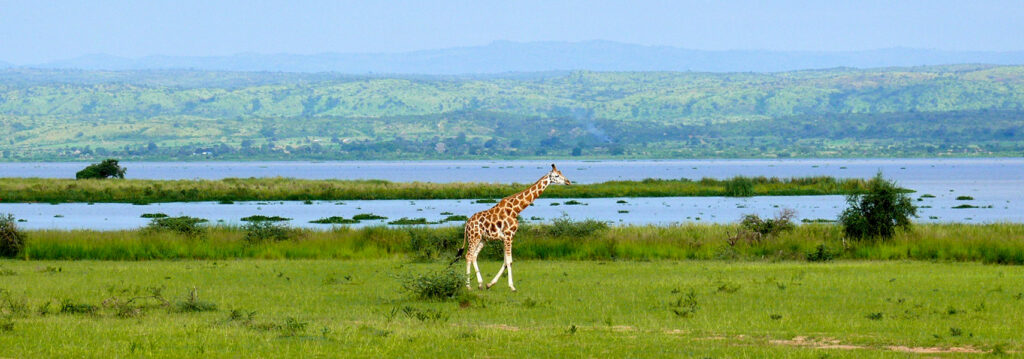05 Jul Uganda – Country in the picture
 Uganda is a landlocked country bordered by Kenya in the east, Sudan in the north, Democratic Republic of the Congo in the west, Rwanda in the southwest and Tanzania in the south. Uganda’s total land area is 241,559 sq km. About 37,000 sq km of this area is occupied by open water while the rest is land. The southern part of the country includes a substantial portion of Lake Victoria, which it shares with Kenya and Tanzania. Uganda is located on the East African plateau, which generally slopes downwards towards Sudan explaining the northerly tendency of most river flows in the country. Although generally equatorial, the climate is not uniform since the altitude modifies the climate. Uganda’s capital Kampala has an annual mean temperature of 17.00C. The elevation, soil types and predominantly warm and wet climate impart a huge agricultural potential to the country. They also explain the country’s large variety of forests, grasslands and wildlife reserves. Uganda has a total population of about 33 million people, of which 56% is under the age of 18 years and 4,6% above 65 years. Life expectancy at birth is 51 years. In 2019, 24.5 % of the total population of Uganda was living in cities and urban areas.
Uganda is a landlocked country bordered by Kenya in the east, Sudan in the north, Democratic Republic of the Congo in the west, Rwanda in the southwest and Tanzania in the south. Uganda’s total land area is 241,559 sq km. About 37,000 sq km of this area is occupied by open water while the rest is land. The southern part of the country includes a substantial portion of Lake Victoria, which it shares with Kenya and Tanzania. Uganda is located on the East African plateau, which generally slopes downwards towards Sudan explaining the northerly tendency of most river flows in the country. Although generally equatorial, the climate is not uniform since the altitude modifies the climate. Uganda’s capital Kampala has an annual mean temperature of 17.00C. The elevation, soil types and predominantly warm and wet climate impart a huge agricultural potential to the country. They also explain the country’s large variety of forests, grasslands and wildlife reserves. Uganda has a total population of about 33 million people, of which 56% is under the age of 18 years and 4,6% above 65 years. Life expectancy at birth is 51 years. In 2019, 24.5 % of the total population of Uganda was living in cities and urban areas.
Other facts:
- MAJOR LANGUAGES – English, Luganda and Kiswahili
- EDUCATION – Literacy Rate: 69 % (male: 76% – female: 63% )
- RELIGIONS – Roman Catholic: 33% – Protestant: 33% – Muslim: 16% – Indigenous Beliefs: 18%
Northern Uganda has long been plagued by violent conflict and insecurity. The brutal and relentless war between Uganda government forces and the rebel group, the Lord’s Resistance Army (LRA), has lasted nearly 19 years. This long-running conflict has led to major violations of human rights against civilians, destruction of infrastructure, reduced access to social services, and paralysed economic activity. Creating peace and fostering reconciliation in the region have not been successful either, thereby hindering development and relief activities, which are further constrained by insufficient funding, and lack of capacity at the district and community levels.
The LRA has abducted over 40,000 civilians; it is estimated that at least 25,000 are children, the main target of the armed conflict to be exploited as front-line soldiers, forced labour or forced to carry out extreme forms of punishment, such as killing fellow child captives trying to escape. Many are still believed to be in captivity, others have died in battle or from mistreatment, disease and hunger. Girls are coerced into sexual slavery to become the ‘wives’ of LRA commanders and subjected to rape, unwanted pregnancies, and sexually transmitted diseases. Fearing abduction, every evening about 40,000 children in northern Uganda (the ‘night commuters’) pour into towns where they seek sanctuary under poor conditions in hospitals, schools, or mission grounds; they return home in the morning. No official assistance is provided to these children, and they can be abused as they make the nightly treks between home and shelter. LRA abductions decreased, but continue to pose threat even today: Abducted children remain missing and presumed in captivity.
Access to education: With the destruction of schools, looting of supplies and shortage of teachers, education in northern Uganda has been severely affected by conflict. Schools have been closed or relocated, and those still operating have been forced to limit their teaching times to those considered to be safe for children to attend (10 am to 3 pm). Many are not attending school for fear of LRA killings and abductions while others, teachers included, have moved to more secure districts where they add to the congestion of the towns. This has created shortages of shelter for teachers and students, scholastic materials, classrooms, drugs, water and sanitation, and recreation facilities.
Endelea partners up with African Youth Initiative Network (AYINET), a youth led and victim centered organisation based in Lira, Uganda. It was founded in 2005 by Victor OCHEN, a war survivor himself, to respond to the dire conditions in a region that suffered over two decades of war.
Source:
- The New Humanitarian – The enduring harm inflicted by the Lord’s Resistance Army – August 2020
- Working Paper: Conflicts, poverty and human development in Northern Uganda – Nannyonjo, Justine – WIDER Research Paper, No. 2005/47

